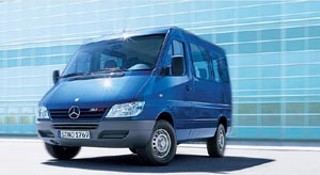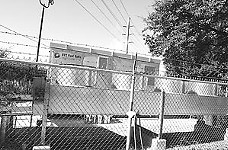Can Austin Kick-Start the Hybrid-Car Future?
Austin Energy looks toward 'electrifying the transportation grid'
By Daniel Mottola, Fri., Oct. 22, 2004

Imagine thousands of next-generation plug-in hybrid vehicles on the road, capable of traveling 20 to 60 miles without producing any emissions or using a drop of petroleum. Then, at night, these hybrids would be plugged into normal wall sockets connected to an all-renewable energy electric grid.
If that sounds good to you, you're not alone; Austin Energy and City Hall have been pondering the idea too, and in September the City Council passed a resolution in support of a plug-in hybrid project that would link the energy and transportation sectors. "The city has done a great job positioning ourselves at the forefront of clean energy on the electric production side. But the real area for opportunity, economically, is going to be transportation," says Council Member Brewster McCracken, who co-sponsored the resolution along with Danny Thomas and Mayor Will Wynn.
City leaders aspire to commit to purchasing thousands of plug-in hybrid Sprinter vans, currently being developed by the Electric Power Research Institute and Daimler Chrysler. (The gas-powered version of the Sprinter is a Mercedes-Benz model.) McCracken said plans include approaching other cities with municipally owned utilities (like New York, L.A., and Seattle) to join Austin, placing one very large bulk order of up to 30,000 vehicles –"We could almost single-handedly create an immediate market for the plug-in hybrids, speeding up production." Depending on how many Austin purchased, the Sprinters could be used as city fleet vehicles or made available for resale to AE customers.
And time is of the essence in introducing these hybrids into the mainstream, as oil prices rise and observers worry about the arrival of "peak oil" – the dangerous point at which increasing fossil fuel consumption surpasses declining global production. "You've got this situation where you're starting to run out of cheap oil, gas prices are getting higher and higher, and the hydrogen economy" – the Bush administration's preferred alternative energy strategy – "is farther off than we thought," said Roger Duncan, Austin Energy's deputy general manager. "The response right now is hybrid vehicles."
The hybrid Sprinter vans get up to 50% better gas mileage, and produce up to 65% fewer greenhouse-gas emissions, than do non-plug-in hybrids. Their all-electric range, according to Duncan, could take care of a full day's urban driving needs; if they aren't then plugged in or run out of charge, they operate just as do regular gas-electric hybrids. "Our transportation system is based solely on petroleum at this point; we've got to electrify the system, [which is] essentially what you're doing with hydrogen vehicles anyway," Duncan said.
Duncan cited a recent study that concluded that renewables bring more environmental benefits when used to replace carbon-based fuels in electric generation than they do when used to create hydrogen. Even if a practical hydrogen car were to be introduced in the near future, we aren't close to having the fueling infrastructure in place to support the switch. Indeed, current methods of producing fuel hydrogen require fossil-fuel energy (usually from natural gas) to initialize the process, so while hydrogen is the cleanest fuel possible, it can't yet solve our energy dilemmas. "A consensus is forming that a hydrogen economy is longer in coming and more difficult than we first thought," Duncan said.
The plug-in hybrids also offer an opportunity that hydrogen doesn't to expand the potential of AE's GreenChoice renewable program. "A GreenChoice customer could not only power their home or business with green power, but convert their transportation to an essentially wind-powered car," said Duncan. GreenChoice relies mostly on West Texas wind farms that at any given time can power 20,000 homes. But the winds don't always blow at a constant clip, and AE's peak energy demand doesn't match up with the peak winds out west. "Our peak load is on hot summer afternoons," Duncan said, but "the wind isn't blowing then; it's blowing on cold February nights more than anything else. We need to increase our night-time load to efficiently take in more wind power, [and] a great way to do this is to plug in hybrid cars."
Even without using renewables to generate electric power, Austin Energy calculates that an electrified transportation grid would produce less net pollution than do gas-power auto engines. "If Austin could become a leader in plug-in hybrid uses locally, it would be incredible for air quality in this region," McCracken said. But recently passed federal legislation extending the production tax credit for wind power opens the door for Austin Energy to acquire more and expand GreenChoice, and Duncan says, "Preliminary numbers indicate that nighttime wind-power prices are already competitive with the cost of gas, especially as the cost of gas increases."
Theoretically, the hybrids also possess a huge energy storage opportunity for Austin; plug-ins have larger batteries, and as long as they're plugged in, they're tied to the electric grid and could supply energy to it. "We are having to build power plants to meet peak energy demands on hot summer days," Duncan says. "If we could draw just a little from these vehicles during peak times, the savings would be tremendous."
In addition to bulk purchases like those being considered by AE, utilities could also use rebates and customer incentives to drum up hybrid sales and motivate manufacturers to expedite plug-in production. Built in Germany, the hybrid Sprinter vans will first hit U.S. soil in early 2005 when testing is set to begin in Southern California. Austin Energy plans to report back to the City Council with recommendations this spring.
Got something to say on the subject? Send a letter to the editor.










